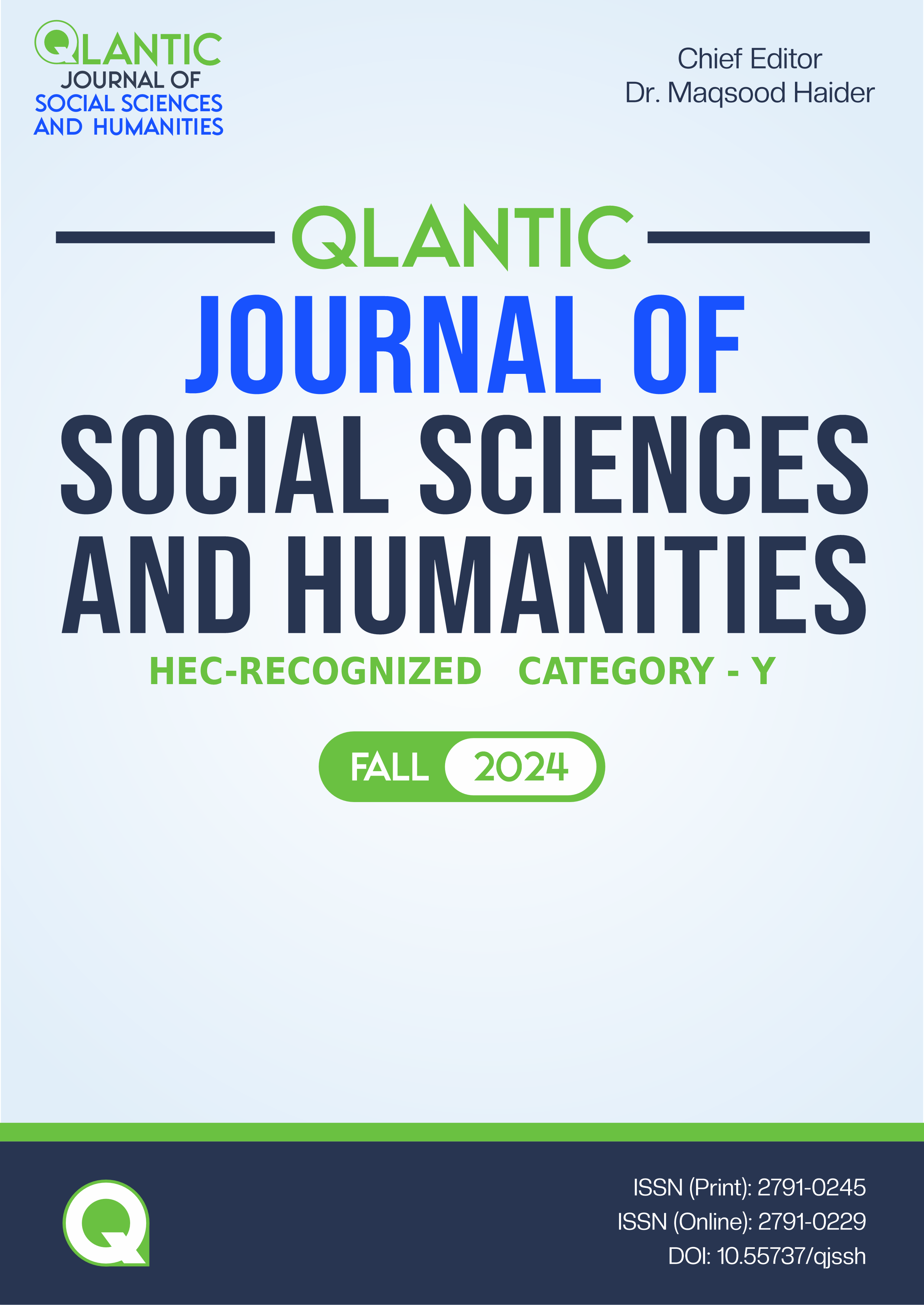Colonial Exploitation and Neocolonial Developmentalism: A Postcolonial Ecocritical Study of Intizar Hussain's Basti
DOI:
https://doi.org/10.55737/qjssh.755973563Keywords:
Postcolonial Ecocriticism, Exploitative Development, Ecological Destruction, Militarism , Basti, NeocolonialismAbstract
Through the prism of postcolonial ecocritical theory, this research paper seeks to examine colonialism's commodification of nature, the environmental degradation at the hands of "ecological imperialism's" agenda of "developmentalism," and the environmental fallout of neocolonial militarism and wars in Intizar Hussain's critically acclaimed novel, Basti (2018). This paper combines Huggan and Tiffin's (2010) and DeLoughrey and Handley’s (2011) theoretical constructs on postcolonial ecocriticism to formulate an integrated theoretical lens for analyzing the novel. The research establishes that Basti (2007) highlights environmental degradation caused by colonial exploitation, the extinction of biodiversity, and the destruction of natural habitats. The novel articulates its ecological concerns by critically reflecting on the installation of electric poles in Rupnagar, the laying of railway lines, and the introduction of motorbikes during the colonial era. It aptly anticipates and maps out the environmental toll of developmentalism and modernization schemes, causing the destruction of natural landscapes and disruption of traditional organic lifeways. Furthermore, by foregrounding the ravages of war and the environmental toll of neocolonial militarism, the novel shows how colonial and neocolonial violence commodifies and destroys nature. It delineates landscape's transformation into a desolate wasteland as an adverse environmental impact of war. This research paves the way for groundbreaking future studies in Pakistani literature that can deepen our understanding of its ecological themes.
References
Berlik, M. M., Kittredge, D. B., & Foster, D. R. (2002). The illusion of preservation: a global environmental argument for the local production of natural resources. Journal of Biogeography, 29(10-11), 1557–1568. https://doi.org/10.1046/j.1365-2699.2002.00768.x
Buell, L. (1995). The environmental imagination: Thoreau, nature writing, and the formation of American culture. Harvard University Press.
Charan, P. (2021). Hope amidst a chaotic state of affairs in Intizar Husain’s Basti. International Journal of Education, Modern Management, Applied Science & Social Science (IJEMMASSS), 3(4), 5–7. https://www.inspirajournals.com/uploads/Issues/81783327.pdf
Davidson, J. (2019). Never say never: Reconciling generational sovereignty with environmental preservation. SSRN Electronic Journal. 1–26. https://doi.org/10.2139/ssrn.3323542
DeLoughrey, E., & Handley, G. B. (2011). Postcolonial Ecologies: Literatures of the environment. Oxford University Press.
Dhandapani, S. (2015). Neo-liberal capitalistic policies in modern conservation and the ultimate commodification of nature. Journal of Ecosystem & Ecography, 5(2), 1–4. http://dx.doi.org/10.4172/2157-7625.1000167
Farooqi, M. A. (2022). The roots of the present are in the past: Recapitulating partition through Intizar Husain’s novel, Basti. Asian Affairs, 53(2), 363–372. https://doi.org/10.1080/03068374.2022.2076480
Gautam, R. S. (2020). Translating trauma: Mediating memory in Intizar Hussain’s Basti. GAP Bodhi Taru: An International Peer-Reviewed Open Access Journal of Humanities, 1(1), 8-12.
Glotfelty, C., & Fromm, H. (1996). The ecocriticism reader: Landmarks in literary ecology. University of Georgia Press.
Guha, R. (2000). Environmentalism: A global history. Longman.
Hassan, S., Khan, M. A., & Quratulain Qaiser. (2024). Socio-Political Underpinnings in Intizar Hussain’s Basti: A Critical Discourse Analysis. Global Political Review, IX(II), 37–44. https://doi.org/10.31703/gpr.2024(ix-ii).04
Huggan, G., & Tiffin, H. (2010). Postcolonial ecocriticism: Literature, animals, environment. Routledge.
Husain, I. B. (2007). Basti. Oxford University Press.
Indriyanto, K. (2019). Hawaii’s ecological imperialism: Postcolonial ecocriticism reading on Kiana Davenport’s Shark dialogues. International Journal of Humanity Studies, 2(2), 123-133. https://doi.org/10.24071/ijhs.v2i2.1724
Jalil, R. (2015). Introduction. In I. Hussain, The sea lies ahead (R. Jalil, Trans.). HarperCollins.
Khan, S., & Digvijay, P. (2015). Intizar Hussain: As a storyteller. International Journal of Multidisciplinary Approach and Studies, 2(3), 128–130. http://ijmas.com/upcomingissue/17.03.2015.pdf
Morton, T. (2007). Ecology without Nature: Rethinking Environmental Aesthetics. Harvard University Press. https://doi.org/10.2307/j.ctv1n3x1c9
Nixon, R. (2011). Slow violence and the environmentalism of the poor. Harvard University Press.
Pirzadeh, S. (2016). Violence, militarism, and the environment in contemporary South Asian literature [Doctoral dissertation]. Purdue University. Purdue e-Pubs. https://docs.lib.purdue.edu/open_access_dissertations/1294
Pirzadeh, S. (2018). Topographies of Fear: War and Environmental Othering in Mirza Waheed’s The Collaborator and Nadeem Aslam’s The Blind Man’s Garden. Interventions, 21(6), 892–907. https://doi.org/10.1080/1369801x.2018.1558090
Rahman, M., Ilyas, T., Shah, M., Shakir, S., Qail, U. Q. K., Fatima, S., Parveen, N., & Abbas, S. A. (2022). Nostalgic elements in Intizar Hussain's novel Basti. PalArch’s Journal of Archaeology of Egypt / Egyptology, 19(4), 1194–1201. https://archives.palarch.nl/index.php/jae/article/view/11602
Rawat, G., & Gaurav, V. K. (2023). Colonial Invasion and Environmental Degradation in Wangari Maathai’s Unbowed: A Memoir. Hypatia: A Journal of Feminist Philosophy, 38(2), 405–422. https://doi.org/10.1017/hyp.2023.37
Roy, A. (2002). The algebra of infinite justice. In S. Hawthorne & B. Winter (Eds.), September 11, 2001: Feminist perspectives (pp. 330–338). Spinifex Press.
Rueckert, W. (1996). Literature and ecology: An experiment in ecocriticism. In C. Glotfelty & H. Fromm (Eds.), The ecocriticism reader: Landmarks in literary ecology (pp. 105–123). University of Georgia Press.
Shiva, V. (1999). Biopiracy: The plunder of nature and knowledge. South End Press.
Shiva, V. (2015). Earth democracy: Justice, sustainability, and peace. North Atlantic Books.
Sidhwa, B. (1988). Ice-candy man. Penguin Books.
Singh, K. (1956). Train to Pakistan. Chatto & Windus.
Solarin, S. A. (2020). An environmental impact assessment of fossil fuel subsidies in emerging and developing economies. Environmental Impact Assessment Review, 85, 106438. https://doi.org/10.1016/j.eiar.2020.106443
Usman, T., Shehzad, O., Hasnain, S. I., & Sheraz, S. (2022). The Giddy Circles Of Partition: Displacement And Dilemma In The Novel Basti By Intizar Hussain. PalArch’s Journal of Archaeology of Egypt / Egyptology, 19(1), 1377-1384. https://archives.palarch.nl/index.php/jae/article/view/10908
Published
Issue
Section
License
Copyright (c) 2024 Noor ul Qamar Qasmi, Muhammad Zuhair Akram

This work is licensed under a Creative Commons Attribution-NonCommercial 4.0 International License.





